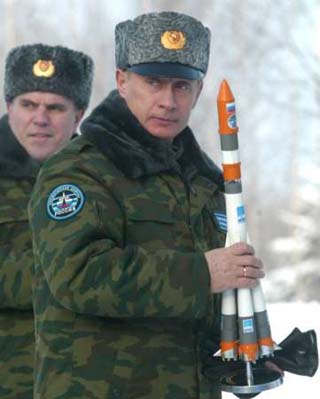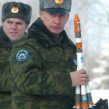
RECRUITING PROFESSIONAL SERGEANTS RUSSIAN-STYLE
Publication: Eurasia Daily Monitor Volume: 4 Issue: 101
By:

This week the Russian Ministry of Defense held a conference of sergeants and other serving non-commissioned officers at the base of the elite 27th army brigade, just outside Moscow. Some 424 NCOs were scheduled to attend, representing units from all across Russia and from all branches of the armed forces (Itar-Tass, May 21).
First Deputy Defense Minister Alexander Belousev is in charge of organizing the conference. General Belousev told me at a press briefing last week (May 16) that 70% of the NCOs selected to attend the conference will be contract soldiers, while the rest are conscript sergeants. Today, May 23, Defense Minister Anatoly Serdyukov and other high brass will address the participants. The conference is scheduled to adopt a resolution that will be disseminated throughout within the armed forces, emphasizing the need to have competent, professional volunteer sergeants and other NCOs.
This conference of acting NCOs is, of course, very Soviet in nature. In communist times selected writers, scientists, miners, artists, and members of other groups were regularly gathered to attend grand meetings to “exchange progressive experience” and to pass resolutions prepared by the Communist Party hierarchy. Today the idea of gathering over 400 young NCOs near Moscow and then have them fan out across the great Russian landmass to spread the word that a modern armed force cannot function properly without well-trained sergeants seems tedious and archaic. Still, it is better than nothing. The Russian military seems to finally have accepted the advantages of an all-volunteer fighting forces, lead by all-volunteer NCOs and officers.
Up to now, Russian military units did not have long-serving professional sergeants. Instead, there were conscript sergeants that became NCOs after three or four months of sergeant school. Most of these men were 18- and 19-year-old high-school graduates, who were poorly trained and motivated. According to Belousev, these conscript sergeants are useless as surrogate NCOs. Without effective NCOs, low discipline and mass hazing of recruits ensues.
In most cases, their longer-serving comrades — the “grandfathers” — haze enlisted conscripts. Half-baked conscript sergeants in most cases are not ready to be true leaders of detachments or experienced enough to keep discipline and order in conscript units. For decades in the Soviet and Russian military, long-serving conscripts have filled the vacuum created by the lack of professional NCOs, safeguarding discipline, order, and unit traditions. The commanding officers tend to ignore the “grandfather’s” methods of disciplining younger soldiers as long as there is at least some semblance of order in the barracks. While there are no professional NCOs in the Russian armed forces, the “grandfather” soldiers are indispensable as an organizing force in the barracks, so officers indirectly encourage hazing.
As the Russian conscript saying goes: During the first year of service the “grandfathers” beat you; during the second year of service you beat the newly enlisted in turn. Now this long-standing, seemingly stable but inhumane system may be ending. In accordance with President Vladimir Putin’s military reform plan, beginning from 2008 conscripts will serve only one year. Putin has also called for all NCOs to be contract soldiers, and Belousev announced that a new special federal project is being prepared to address this matter. Putin has called for the professional NCO program to begin in 2009. However, Belousev stated that the paperwork is not finished, the Finance Ministry believes the Defense Ministry is overestimating the cost, and the professional NCO program may begin in 2009, 2010, or later.
I asked Belousev: Is the Defense Ministry considering creating a capable professional recruiting service or a well-rehearsed beginner’s training and screening program to weed out drunks and bums that volunteer to serve? The General replied he did not understand what a “professional recruiting service” looks like and that all recruiting will be done by regional “military commissars” that at the same time muster in conscripts. According to Belousev, there are no plans to create new sergeants academies, and new contract NCOs will be trained in the existing conscript sergeants’ schools. Belousev acknowledged that contract pay is too low and it is hard to find good men to serve as privates or sergeants. As a result, conscripts still today staff most elite airborne units.
Last month a pro-Kremlin news site reported a case of hazing in an elite rangers unit of the Main Intelligence Directorate (GRU) based near Yekaterinburg in the Urals. Four fresh recruits told prosecutors that the unit contract sergeants intimidated them into signing three-year soldier contracts after only three months of conscript service. The sergeants forced them to hand over all their contract pay and also reportedly forced soldiers to assault local civilians to bring in more protection money (www.strana.ru, April 3).
The Russian generals that have been put in charge of creating new all-volunteer units with professional sergeants do not seem to fully understand what to do. It also may be that some of the generals are deliberately trying to undermine the principle of an all-volunteer force. If contract soldiers and sergeants turn out to be bums and rascals — worse that conscripts and more expensive for the budget — the Kremlin may heed calls to end all reform efforts and fully restore the Soviet military system.




